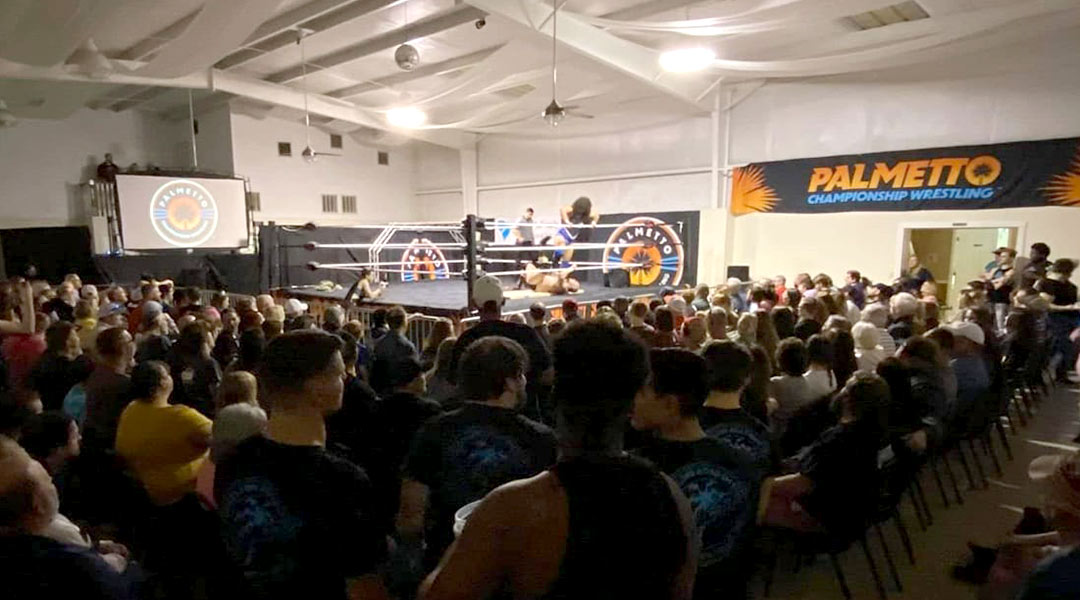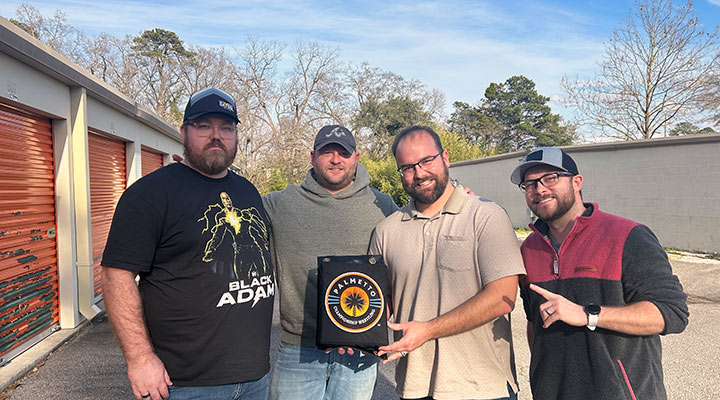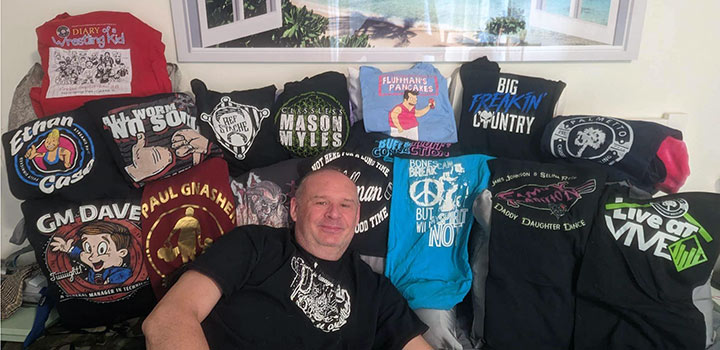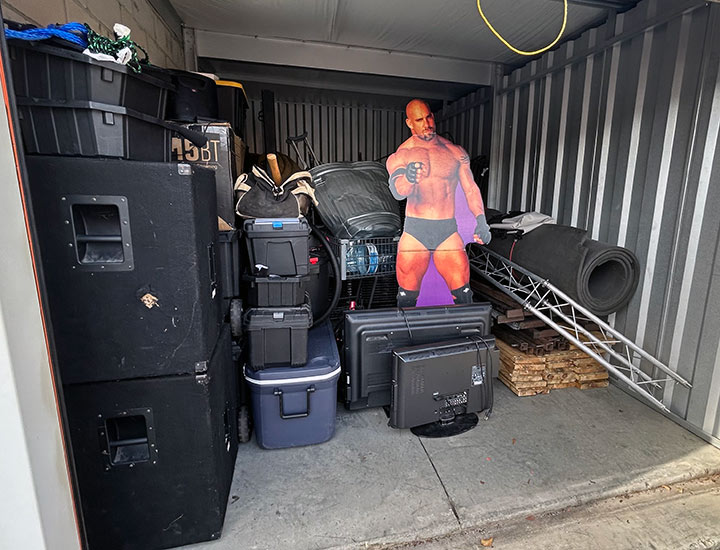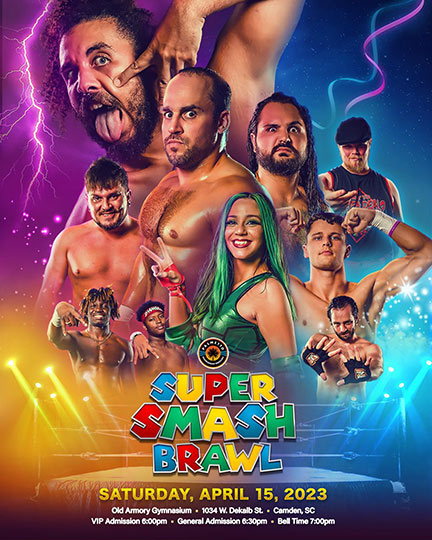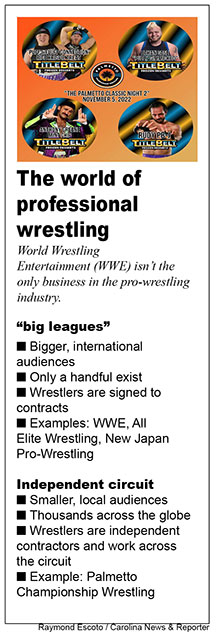A packed crowd watches a show put on by Palmetto Championship Wrestling, a Columbia-based professional wrestling company. (Photo courtesy of Palmetto Championship Wrestling)
When you hear the words “professional wrestling,” what comes to mind?
Images of arenas full of people watching two larger-than-life athletes – or stars like Dwayne “The Rock” Johnson or John Cena – duking it out? Or maybe you think about World Wrestling Entertainment, which has held a near monopoly on the product for the past two decades.
But there is a lot more to the world of professional wrestling than WWE or even its major competitors, such as All Elite Wrestling or New Japan Pro-Wrestling.
“I live, breathe, love everything professional wrestling,” said Shane Dorr, founder and co-owner of Palmetto Championship Wrestling. “It’s just always captivated me.”
Palmetto Championship is one of hundreds of smaller wrestling companies across the globe that make up what’s referred to as the independent circuit. These promotions offer fun and local alternatives to the big national shows of companies such as WWE.
Not only do these independent promotions put on their own shows, they usually do it with much smaller crowds than people are used to seeing on television.
These shows also are held in seemingly odd places: high school gyms, wedding venues, even churches.
Odd venues are actually part of the charm of the independent circuit.
The independent circuit might not have the grand scale of big leagues, but that has never stopped its fans from coming back.
The people’s company
Watching professional wrestling can be a lot like watching any other sport. Sure, you can watch it on TV.
But watching it live in the crowd as a fan is an unforgettable experience.
Because of their international touring schedules, the big leagues such as WWE and All Elite may take years to return to the same city with one of their main shows.
In February 2022, WWE returned to Columbia with its flagship TV show. It was the first time in 10 years the show had been broadcasted from the Capital City.
That absence of WWE shows allows local companies to fill in the gaps.
Palmetto Championship’s Dorr said fans’ experiences and interactions are the most important priorities for him.
“There’s not a person that walks in the door of a PCW show that does not shake my hand,” he said.
Dorr isn’t the only one to express that sentiment.
“If you don’t have customers or fans, you don’t have a business,” said Elliot Poston, co-owner and ring announcer of PCW.
Jonathan Winburn, the chief financial officer and another owner of PCW, agreed.
“They’re paying to come watch a show, so it is our responsibility to make sure that they’re taken care of and that they absolutely get their money’s worth,” he said.
Fans of Palmetto Championship are sometimes people who follow the big leagues but are newcomers to the independent circuit.
Michael Salter of Columbia said he remembers watching wrestling legends such as “The American Dream” Dusty Rhodes fighting in the Township Auditorium in Columbia. It was a show put on by Mid-Atlantic Championship Wrestling before WWE’s dominance.
Salter attended his first PCW show in 2017. One evening later, he was hooked.
“As the first match started, I became (as) excited as if I was in the ring wrestling,” Salter said. “I could hear every chop and feel every body slam. I screamed, chanted and felt so happy.”
Salter said after the show ended he had the unique opportunity to talk with many of the wrestlers. He was so impressed with PCW that he has only missed a handful of the company’s shows since.
“I felt like I was part of this great wrestling show,” Salter said.
The independent circuit also reaches out to people who aren’t yet fans.
“I just love talking to people that are ‘not wrestling fans,’ because at the end of it, I’ll make you a fan of Palmetto Championship Wrestling, for sure,” Dorr said.
Dorr, Poston, and Winburn said wrestling has something for everyone: athleticism, storytelling, action, emotions and live performances. The list goes on.
“The best fan that can come to one of our shows is the one that’s not a wrestling fan,” Dorr said. “Because more often than not, that’s the person that’s going to come back.”
The passion and friendship behind the promotion
Dorr founded PCW as a passion project back in 2015 after watching another independent promotion’s show.
“I’ll never forget it,” Dorr said. “I looked at the guy I was with in the crowd. I said we can do this better.”
Poston, a friend of Dorr’s, later became PCW’s ring announcer.
Dorr said a proud moment for the company was when a Palmetto Championship show competed with an untelevised WWE event in Columbia.
“Ran head-to-head at North Springs Parks with NXT and outdrew them,” he said. “That’s when we were drawing crowds of 500+ every month.”
Even with that success, Dorr and Poston still worked day jobs and had their own lives and families.
Dorr sold the company in 2021 to a friend, Henry Shugars. At the time, he had lost the passion for the business and his life was changing, he said.
But the emergence of All Elite reignited that passion.
The three said wrestling has become more accessible and the shows have a higher quality than ever before.
Dorr and Poston planned to amicably reacquire the company from their friend. Winburn, another close friend, joined them.
This plan was all or nothing. Either all three agreed to be part of the company, or the deal was off.
In late February 2023, they became co-owners.
“We all worked together at one point,” Winburn said. “That’s kind of where the friendship started … the bond over wrestling.”
Their families supported the plan.
“(My wife) was like, ‘Why would you not?’” Poston said.
Dorr said after he sold PCW his wife told him she never wanted anything to do with wrestling again.
But when he told her what he wanted to do with Poston and Winburn, she “lit up like a Christmas tree.”
“She said, ‘Absolutely, I want to be a part of it,’” Dorr said. “For her to say that … it’s a pretty big deal.”
Winburn had never been involved with the company. But his wife and his teenage son backed him.
“My son’s completely on board,” Winburn said. “He’s already asking what he can do to help or, you know, wanting to be at the show and stuff like that. … Having the support behind me definitely makes it easier.”
Supporting wrestlers themselves
While the life of a professional wrestler signed to WWE or All Elite is all fame and fortune, the life of an independent wrestler is usually the exact opposite.
Ethan Case has been a wrestler on the independent circuit for 19 years and has been closely involved with Palmetto Championship since late 2016.
He said his road to becoming a wrestler was a grueling one.
“It starts as a hobby,” he said. “Building a brand and a name. … Until you can do that, you can’t make a living. I didn’t become a full-time wrestler until 2017.”
The independent circuit also has changed since the time he began.
“It was very cutthroat,” he said. “I worked so many shows with less than 10 people in the crowd my first five years.”
Case said, now, the circuit’s rise in popularity has given independent wrestlers a better chance to hone their craft.
Palmetto Championship does more than give wrestlers exposure. It also helps prepare the next generation.
Case is head coach of Palmetto Wrestling Academy, PCW’s wrestling school in Columbia. He teaches his students everything from in-ring skills to merchandising themselves online.
“My students make more in their first year than I did in my first five combined,” he said.
Palmetto Championship’s Dorr, Poston and Winburn said there is “no greater honor” than giving up-and-coming wrestlers a great working environment and one they remember fondly, even if they get signed by the big leagues.
“It’s the farm system,” Poston said. “Many people think independent (circuit), they just think wrestlers. But I mean, you also have referees, ring announcers and managers.
Everybody’s being watched, he said.
“It’s a guarantee that if you go to a quality independent (show), you are going to see somebody that is going to be on TV at some point,” Dorr said. “Take that to the bank.”
Case said while the job is a struggle, it’s still rewarding.
“Guys that I’ve helped get started or trained, watching them reach WWE, AEW, or overseas is always cool,” he said. “I love entertaining . … I have a job where people can come for two to three hours and just forget about all of the stuff they have going on in their lives and just enjoy the moment.”
Elliot Poston, Henry Shugars, Shane Dorr and Jonathan Winburn, left to right, hold up a corner piece of their wrestling ring (turnbuckle pad) after a business deal. (Photo by Raymond Escoto)
Michael Salter usually buys a T-shirt at every PCW show he attends. Over the years, he’s built up a collection. (Photo courtesy of Michael Salter)
A storage unit holds Palmetto Championship’s speakers, monitors, parts of the ring and the stage’s entryway. (Photo by Raymond Escoto)
The promotional poster for Super Smash Brawl, Palmetto Championship’s next show, in April (Photo courtesy of Palmetto Championship Wrestling)

